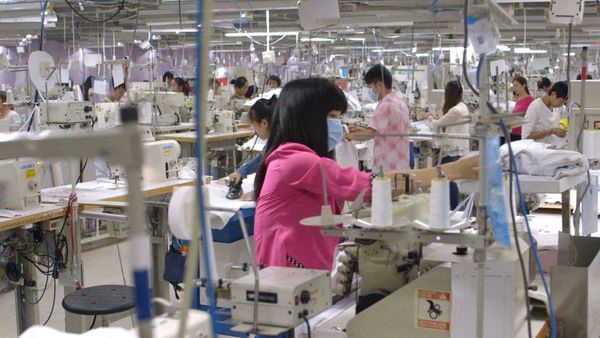Eye For Film >> Movies >> The True Cost (2015) Film Review
The True Cost
Reviewed by: Jennie Kermode

On the 24th of April 2013, the Rana Plaza building in Savar, Bangladesh collapsed with the loss of 1,129 lives. A further 2,515 people were injured, many of them left with permanent disabilities. It was a wake-up call to the world, grabbing the attention of people who had never previously thought about where the cheap clothes they bought were made. But whilst the scale of this particular disaster made it stand out, the reality is that people die as a result of unsafe working conditions in factories like this all the time; and that despite a few short-term boycotts of related companies, few people's shopping habits really changed.
In this ambitious documentary, director Andrew Morgan looks at the day to day experiences of people working in the clothing industry in Bangladesh today, hearing about their worries, the difficulties caused by low wages, the way some of them have been beaten up for asking for better working conditions. He also looks at other human impacts of the global fashion industry, meeting Haitians whose local industries have been wiped out by the import of cheap US cast-offs, Indians concerned about the pollution of the holy Ganges by the run-off from tanneries, a US cotton farmer's wife convinced her husband's death was caused by the pesticides he had to use. It's framed with a dialogue about fast fashion, the wear it once and then throw it away approach that has many Western consumers hooked, with prices falling lower and lower when only at the production end are there any margins to cut.

There's lots of solid material here. Whilst very little of it s saying anything new, it may well be revelatory to its target audience. Its prime difficulty is that in spreading its net so widely it really doesn't have time to look in depth at any one of its subjects, and the links between them may not always be clear to the uninitiated. As it drifts away from the fashion theme into an increasingly generalised critique of global capitalism, it's likely that a lot of viewers will find themselves lost. And although there's value in this critique, Morgan struggles to articulate an alternative vision. Stella McCartney makes a rather vague plea for the industry to do things differently and there's a look at one clothing company trying to put this idea into practice, but nothing is resolved, even in theory, a systemic level. There's a danger that viewers will go away feeling too overwhelmed by the problems presented to them to take any useful action.
By piling horror upon horror, The True Cost also risks diminishing the impact of individual incidents, and overall it doesn't punch as hard as it should. It's can't be faulted for effort, however, and it will make a good starting point for people interested in learning more about this complex industry. In many ways it's a good guide for people just getting involved in fashion professionally, or studying it at college, as it provides a through overview of the production side of the business (equally disturbing issues in promotion and logistics are wisely set aside). Morgan certainly has talent; he just needs to learn to combine his hard work in production with a style that can command mass appeal if he wants to get his product into new markets.
Reviewed on: 20 May 2015















